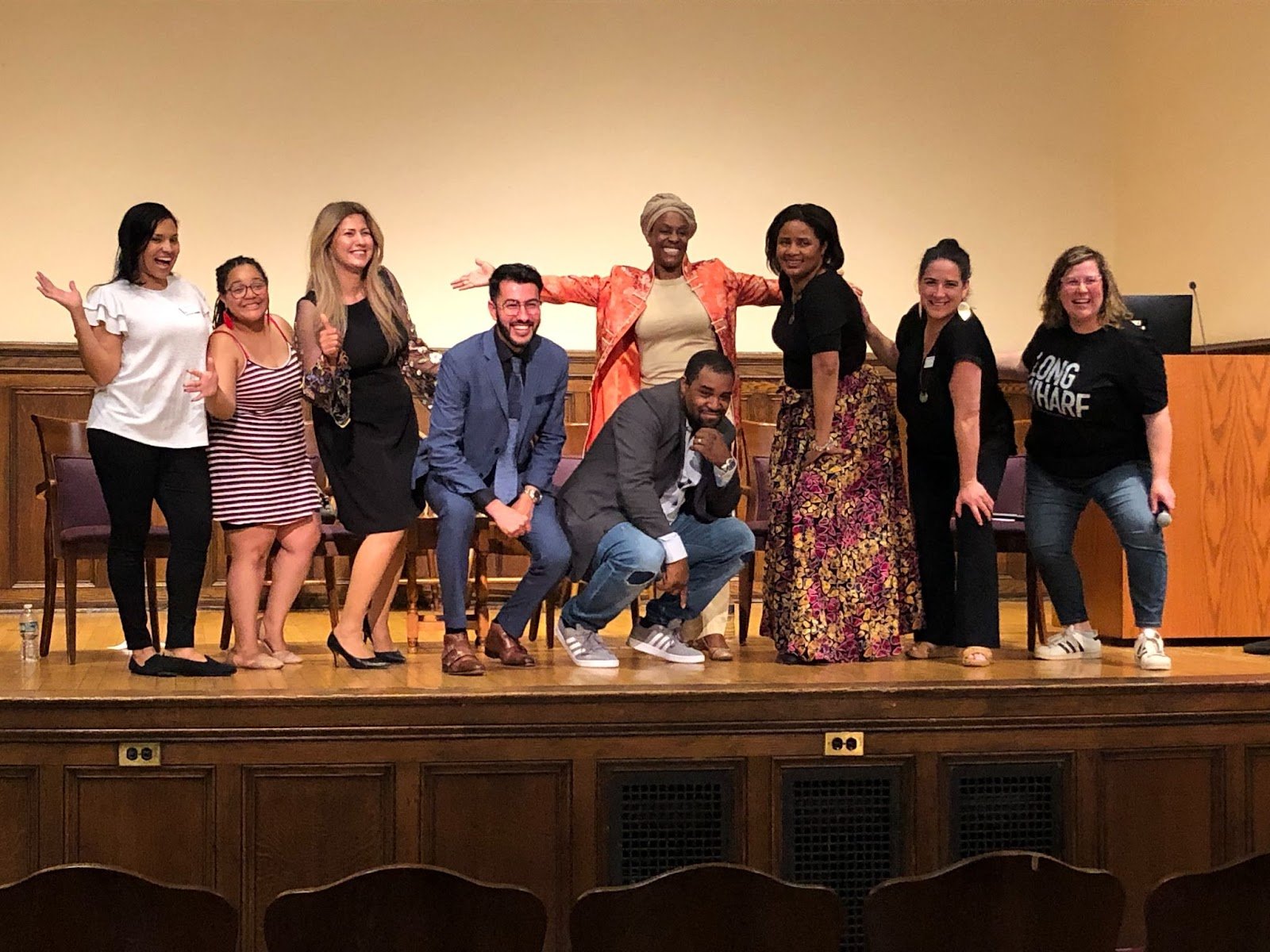
Cast, crew and members of Long Wharf Theatre staff. Nevaeh Lugo Photos.
A woman is hard at work wiping the coffee table in her living room clean. A door opens audibly, but the scene stays focused on the woman until she looks up. Instantly, her expression changes: fear and worry replace her calm and focused gaze. The camera angle switches to reveal her son, sporting facial injuries and a stoic stare.
It isn’t until his mother approaches him that his composure breaks, and his lip begins to tremble. Tears spring to his eyes.
This is just one scene from I Am: Muslim/American, this year’s iteration of the New Haven Play Project from Long Wharf Theatre and an incredibly able cast and crew. On a recent Sunday, a screening and talkback came to the Whitney Humanities Center in downtown New Haven.
Written by Aaliya Miller and directed by Halima Flynn, the film showcases the stories of Muslim Americans living all around Connecticut. Working together, the playwright and director started with interviews, and reimagined them into a screenplay.
Taken apart and together, the stories shed light on the diverse Muslim experiences in the state, in the hopes of sparking meaningful conversation between Muslim and non-Muslim communities. It marks an evolution of the New Haven Play Project, which began in 2018 with a collaboration between Integrated Refugee and Immigrant Services (IRIS) and Long Wharf. Prior to that time, Long Wharf ran a collaboration with Tower One/Tower East called the Elder Play Project for years.
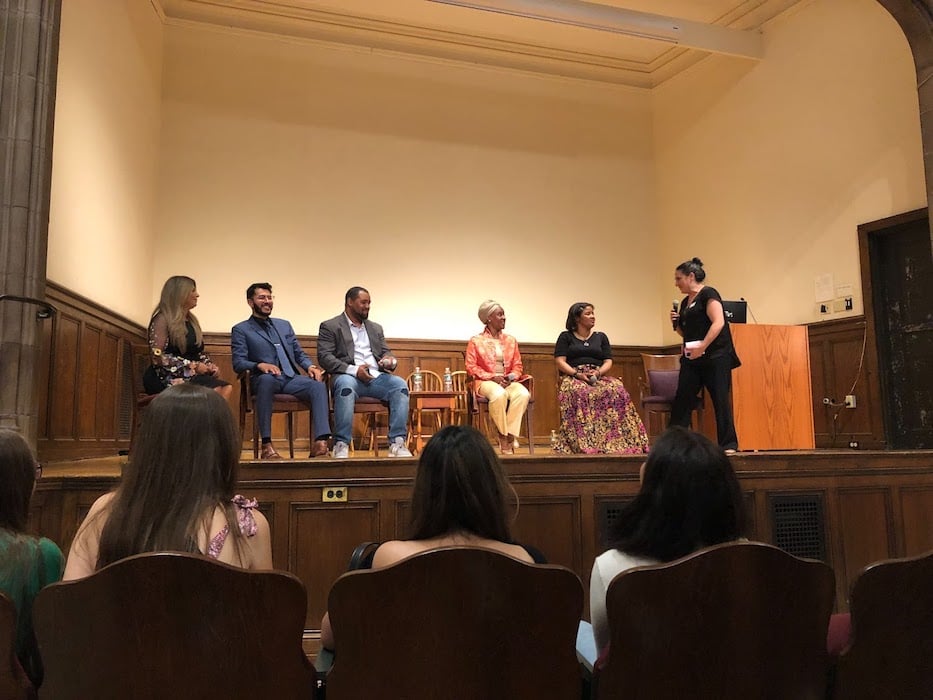
“I think, at a high level, we know the misinformation that comes out about Muslim Americans in our media,” Miller said. “So we wanted to challenge that narrative, but we also wanted to go a little bit deeper and look at how people are living their lives.”
I Am: Muslim/American, which was supported entirely by a Building Bridges Grant from the Doris Duke Foundation, started as a film accompanied by a stage play. Due to pandemic-era restrictions under which the crew was working, the creative team decided to merge the project into a film for simplicity.
Just as it had lived many lives before and during the pandemic (read more about that here, here and here), this version of the play project aimed to center community and storytelling, despite the lack of a physical stage and audience. The interviewing process began in 2021, as Miller and Flynn toured Connecticut to collect the stories of Muslim Americans in the state.
According to Miller, some of the biggest challenges included scheduling the interviews, and “really having to meet people where they’re at.” She said that crew members also struggled with “asking people to give up themselves to tell what are some very personal, not easy stories to tell.”
The filmmaking process came with many different challenges, but most members of the crew agreed that the biggest obstacle was working around deadlines, as the entirety of the film was recorded in the span of two long weekends, which lasted Thursday night through Sunday.
Andre Griffith, the film’s editor and director of photography (DP), emphasized how challenging it was to work against the clock. He explained that the limited time affected him at both positions.
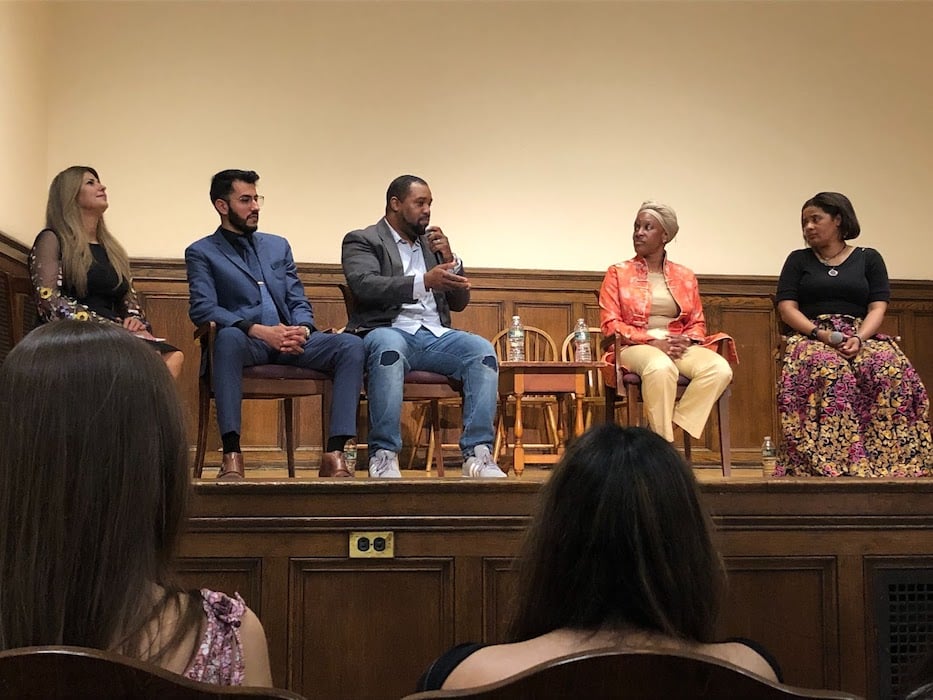
“As a DP, the biggest obstacle was really time.” Griffith said. “I like to be thorough and get a variety of shots, and in the time frame that we had, I could not get all the shots that I wanted to get, which then translates over to editing, where there are some shots that I would have placed differently, but I didn’t have the shots to do it.”
Flynn had a different take on the experience, noting that the limited time resulted in more resourcefulness from the cast.
“Even though we were challenged with time, a lot of the challenges, I think, helped us find solutions we would not have looked for otherwise,” Flynn said.
During the making of the film—an interfaith process, crew members noted— creative team members said they strove to be open-minded and respectful of each other's voices and opinions. This especially delighted Bushra Mahdi, the film’s costume designer, who recalled a time she made a correction to the film and was heard rather than rebuked.
Mahdi, whose son Maher Mahmood also assisted with the film, is herself a refugee from Iraq; she came to New Haven with her family in 2014. For her, working on the piece was personal.
Mahdi said that when she saw the filming of the prayer scene that starts the film, she noticed something was wrong with the way the actor was praying. She was a bit nervous at first, but spoke to Flynn and showed her the proper way to pray. Flynn was happy for the criticism and made the appropriate adjustments to the scene, she said.
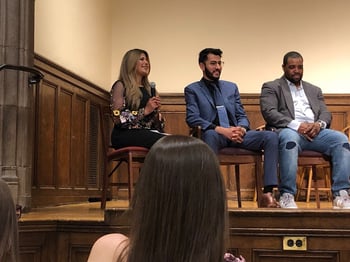
As the film rolled Sunday, I am Muslim. I am American split itself into three parts, all of them fitting into a broader whole. The first told the story of a teacher, John, who reunites with a past student of his named Jay during a taxi ride. John remembers how he helped Jay turn his life around after he was arrested as the result of a drug and gun bust at his house.
Jay, in turn, reveals to John that he converted to Islam and is working on a teaching career of his own. John congratulates him and offers advice for his conversion and his future.
The second shows a group of Muslim women visiting a restaurant and exchanging stories about their experiences in their religion. They exchange moments that made them feel welcomed and appreciated, including a fitness trainer being understanding to his student as she fasted, and a Muslim comedian breaking the ice at her show to an interfaith audience. They also experience microaggressions at the restaurant, such as being asked “Where are you really from?”
The third part shows a man, Rafi, and his friend playing basketball with two non-Muslim men. A fight breaks out between Rafi and one of the men after he begins to hurl Islamophobic insults at Rafi. After going home and speaking with his mother, Rafi is then shown performing slam poetry, coining the term “I am Muslim. I am American.” in a call to fight against Islamophobia and erase misinformation in society.
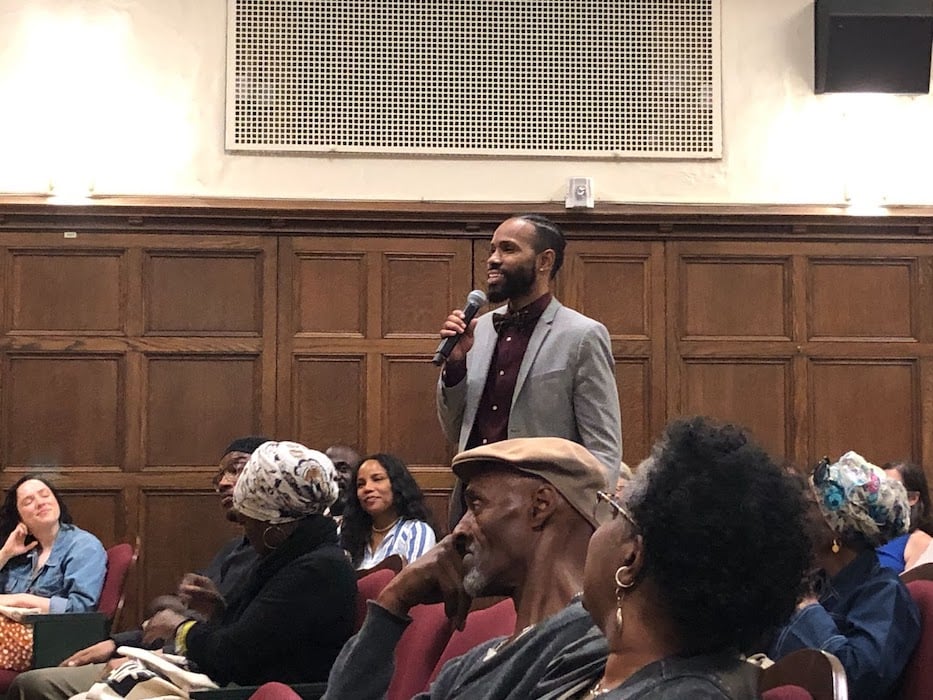
After the screening of the film, the crew sat down together and opened the room up for questions and comments. This allowed for a discussion between cast, crew, and viewers about what stuck with them from the film.
Sidra Syed, the actress who played a character named Kadisha, enjoyed her time working with the cast and crew and said it was emotional to see scenes that she could relate to represented in the media.
“Part three, it was so emotional because a lot of Muslims, we know people, or we’ve experienced the racism and being called a terrorist, and seeing that and seeing the presentation of that, being able to relate to that was emotional and it was a great message that was spread.” Syed said.
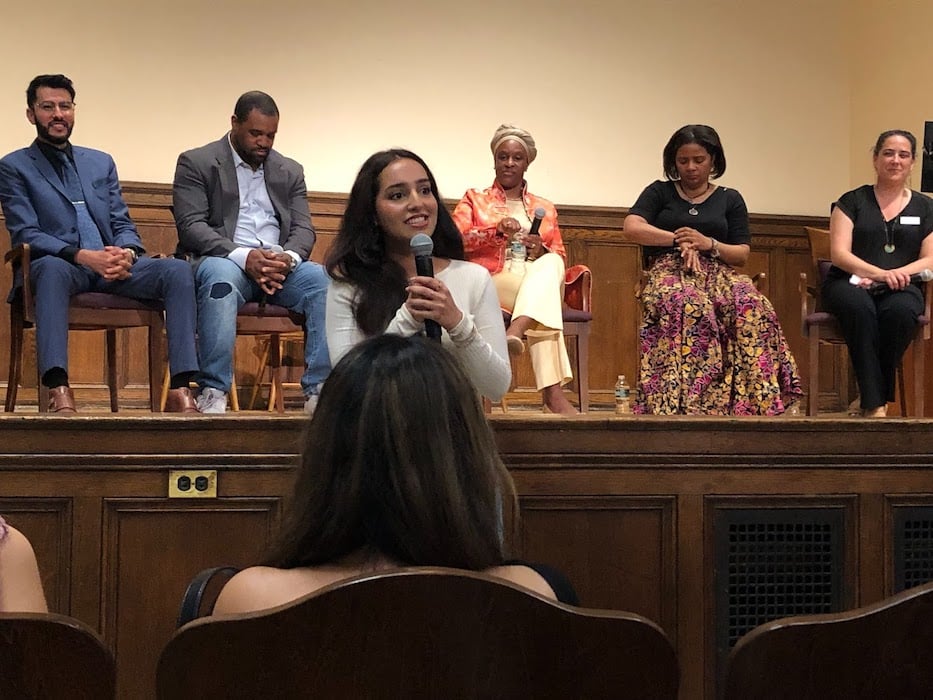
Miller said that the purpose behind the title I Am: Muslim/American stemmed from a shared sentiment between all the people she and Flynn interviewed. It doubles as a representation of the Muslim American community and an outcry for equal treatment in today’s society.
“With Muslims, people see them as Muslim first, then they have to explain that they are American.” Miller said. “When you are a minority in this country, you never get to be just American. You have to be something first.”
For more details, including the full film credits and each crew member’s personal story, visit Long Wharf Theater’s Website here. This article comes from the 2023 Cohort of the Youth Arts Journalism Initiative. Nevaeh Lugo is a recent graduate of West Haven High School. To read more about the YAJI 2023 cohort and read more from students and alumni, click here.